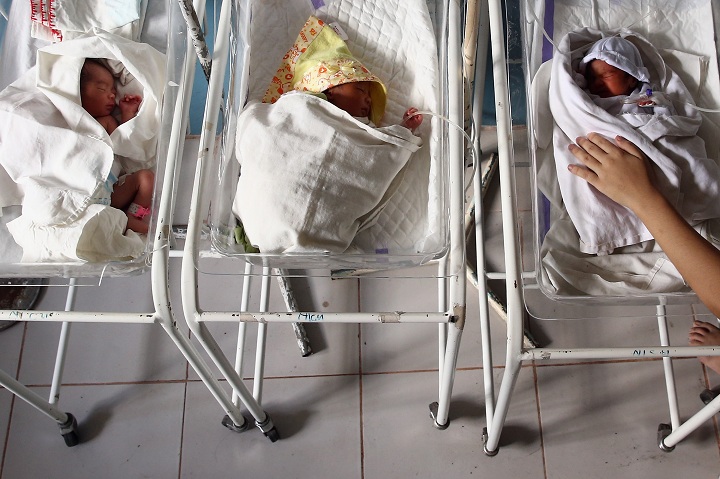They raised you, so wouldn’t they have the most wisdom when it comes to parenting? Not necessarily. New research is warning that grandparents’ old-school parenting advice may be putting babies’ health at risk.

New recommendations, from sleep positions to when to eat solid food, have been introduced over the past decade or so making old advice your parents once relied on outdated, according to U.S. doctors out of the Cohen Children’s Medical Center.
“It’s important that pediatricians not make the mistake of taking for granted that because these grandparents have raised children already, they have the wisdom of the ages,” Dr. Andrew Adesman, chief of developmental and behavioural pediatrics, said. He’s the study’s lead author.
“We shouldn’t assume that just because they’ve raised a child before, they’re experts,” he told NBC News.
READ MORE: Is the ‘2-minute’ countdown bad parenting? Here’s why kids have a meltdown
Adesman’s findings are based on a study he carried out with the help of 636 grandparents.
For starters, 44 per cent of grandparents thought that “ice baths are a good way to bring down a very high fever.” But ice baths pose a hypothermia risk and could worsen a child’s condition.
Nearly one-in-four grandparents didn’t know that babies need to be put to sleep on their backs, not their stomachs or sides. Correct sleep position is key to avoid sudden infant death syndrome (SIDS).

Get weekly health news
READ MORE: Why Canadian docs say too much TV for your toddler could lead to bullying in school
Keep in mind, experts now call for making sure there is no loose bedding or toys in the crib, too.
When it comes to scrapes and cuts, 68 per cent of grandparents didn’t know that wounds heal better when covered. Most knew that butter isn’t a good ointment for burns, though.
Over the past few decades, other guidelines have changed, too. Kids now sit in rear-facing car seats instead of facing forward. Pediatricians also now recommend that solid foods be introduced at about six months, depending on the infant.
Adesman said that grandparents have good intentions, though. It’s just that updated practices may be catching grandparents “unaware.”
READ MORE: What’s your son learning from superhero culture? Study suggests it’s aggression, not heroism
This is where pediatricians come in: they can help by filling in grandparents on current parenting methods, he said.
Frontline doctors can also ask grandparents how they’re faring if they’re filling in as full-time parents. In the U.S., more than seven million children are raised solely by 2.7 million grandparents, according to the US Census Bureau.
The opioid epidemic, parental incarceration and problems with parents’ physical and mental health are just some of the reasons, according to Adesman.
READ MORE: Here’s how Disney princesses are influencing your daughter – and son, too
In Canada, the numbers are growing, too: Cangrands, a non-profit organization that provides support to “caregiver families” estimates that 62,000 kids are raised by grandparents or other next-of-kin.
When grandparents take on the role of primary caregiver, their own health falls to the wayside too, Adesman warned.
“When grandparents step up to the plate, it can be wonderful for grandchildren but can also pose challenges in terms of lifestyle, finances, and mental and physical health to a somewhat older or elderly cohort,” Adesman said.
READ MORE: Want your daughter to break barriers? Dads should do chores, study suggests
In his study, he found that grandparents felt they were doing a good job but they didn’t have support or resources and felt alienated from their own peer group. About 40 per cent felt like choosing to parent their grandchild negatively affected their own emotional and physical health.
These isolated grandparents need to rely on support groups and counselling, he said.
Adesman’s full findings were presented this week at the Pediatric Academic Societies Meeting.
carmen.chai@globalnews.ca
Follow @Carmen_Chai







Comments